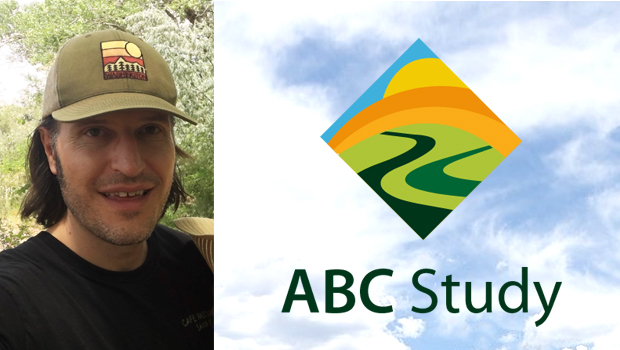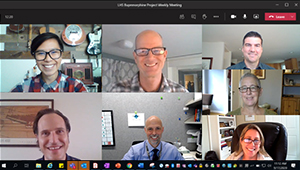Understanding the needs of people seeking care for substance use

Joe Glass is focused on delivering evidence about what works to help patients engage with alcohol or drug use treatment
Joe Glass, PhD, MSW, an associate investigator with Kaiser Permanente Washington Health Research Institute (KPWHRI), conducts research that can help more people get care for alcohol or drug use that negatively impacts their health. He recently received new funding for a study called Addressing Barriers to Care for Substance Use (the ABC Study), which will design and test an intervention to increase rates of substance use treatment by providing motivational and logistical support for patients. The 5-year, $1.9 million grant comes from the National Institute on Drug Abuse via the Center for Dissemination and Implementation (C-DIAS) at Stanford University.
The project brings together many different dimensions of Glass’ expertise. He talked about the trajectory that led to this work and the questions it will help answer.
How did you get started in your field?
I was a psychiatric social worker at the Veterans Affairs hospital in Ann Arbor, Michigan. At that time, I didn't really envision going into research, but I had some background and some skills that were really useful to researchers at the VA, mainly database programming. So, I took opportunities there to help people with their research programs, and they all happened to be addiction researchers.
I was also working in a mental health clinic and I saw the way that general mental health challenges and substance use intersect and impact one another. Often people were more ready to address mental health concerns, but not quite there yet in terms of addressing substance use concerns. I saw the need that was there and became interested in developing research projects that could find ways to support people as they are seeking care for substance use.
How have your research interests evolved?
Initially, I was really interested in understanding problems and quantifying them through a lot of statistical methods, using really unique data sources. I did a lot of studies on quality of care — for example, studying whether people were receiving care that was recommended. I still do that work today, but after I came to KPWHRI, and even a little bit beforehand, I had so much more opportunity to do work in qualitative areas and do trials to test new treatment approaches.
Some of that qualitative work is trying to understand more deeply what people prefer and want help with when they are looking for care. I also brought in my clinical background and experience in health care administration to do some work with implementation science, where we are designing and testing different strategies for bringing research findings into a clinical setting. Over the past 3 years, I’ve made that the biggest part of what I do. My newest project really brings all of those interests together, because we are trying to help folks resolve social and practical needs that get in their way when they are trying to get care, and there’s a motivational component to it as well. These are things I used to do as a clinician. People respond well when you offer them help beyond their clinical concerns — it fosters trust and understanding.
Can you talk more about your new project that was just funded?
We’re partnering with leaders in Mental Health and Wellness at Kaiser Permanente Washington to develop and test a care navigation intervention. What we’re interested in knowing is, for people who are seeking care for substance use, will it be effective to provide a person to sort of hold their hand through the journey? I did some work 8 or 9 years ago that showed that there was really no evidence at all about what you can do to effectively help a person initiate treatment for substance use. So, this study is really addressing that.
The intervention will offer 2 main things. One is motivational support, because often people struggling with substance use have times where they are really motivated to find care, and other times when things get in the way. So, the motivational part tries to help people focus on their goal of getting treatment.
The second piece is helping people resolve the very tangible barriers that get in the way of engaging with treatment. A lot of those things are really basic. For example, making sure people have a good understanding of where they can go to get care, how to get to their first appointment, all the different logistical issues like transportation. Sometimes people aren’t able to get time off work, or they live in a rural area with limited access to treatment centers. Maybe there’s a huge wait list for treatment or it’s difficult to access treatment in their primary language. Sometimes barriers are expected, sometimes they are completely unexpected in terms of what could go wrong, but the focus of the intervention is having someone there for assistance and to help work through these things and address them.
This study is also situated in an implementation science center at Stanford. So, in addition to evidence about whether this intervention is effective, we’re also trying to generate information about how to implement this type of intervention in a health care setting. How can you help a health care organization bring this into practice and keep it sustained?
What makes Kaiser Permanente a good place to do this research?
Kaiser Permanente has internally delivered substance use care and has very high standards for that care. It also contracts with agencies throughout the state to refer people for treatment. So, it offers a place to test this intervention where there’s a lot of representation of different places where people are getting care. We also have good data on whether people are getting treatments that are offered to them. And there are enough commonalities here with other health care organizations that if we find that the intervention is effective here, that evidence would support a similar intervention being used in a different setting.
What do you like to do outside of work?
I really enjoy being outside, and I like to fix things and build things, thanks to my sister, parents, and extended family. There’s a big woodworking contingent in the Pacific Northwest, and so I do a lot of that in my spare time.
Innovations in care

Alcohol and drug use care goes virtual with COVID-19
Kaiser Permanente Washington researcher Joe Glass advises integrating digital prescriptions into existing care.
Research

Better care for patients who drink alcohol
A new primary care approach improves alcohol-related preventive care as well as care for alcohol use disorder.
healthy findings blog

Partnering to advance lifesaving care
Amy Lee describes how the LHS Program is helping KP Washington track and improve treatment for opioid use disorder.


